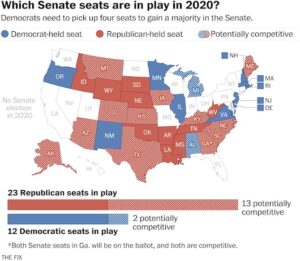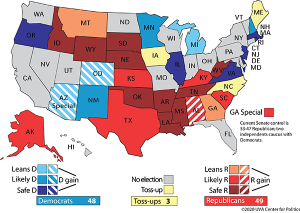Democrats who are focusing all of their hopes on November 3rd need to recalibrate. Read “With early-voting states in mind, Trump campaign resets” by Nicole Sganga at cbsnews.com. As Sganga writes, “In Arizona, a whopping three-quarters of the electorate voted before Election Day in 2016, according to the U.S. Election Assistance Commission, with a greater influx anticipated this year amid the coronavirus pandemic…”I know a lot of people look at the election countdown clock on our wall: it says 91 days,” Stepien told Fox News, Monday. “But ballots will be in the hands of North Carolina voters in 33 days.”…And while North Carolina is the first state to send out absentee ballots beginning on September 4, Georgia follows soon after on September 15, with Florida on September 24. Early voting begins in Arizona the first week of October…According to “Fair Fight,” a voting rights group established by former Georgia minority leader Stacey Abrams following her gubernatorial defeat, Georgia is now home to over 750,000 new voters who were not registered and eligible to vote in 2018…In the 2016 election, over 2.7 million registered voters — 28.7% of the state’s turnout — cast their ballot by mail in Florida.” Democrats must make their supporters more aware that the presidential election begins next month in a number of key states, and mobilize their voters to bank their votes as early as possible to minimize the mess on November 3rd.
On the same topic, Jason Lemon writes in “Early Voting Starts Next Month in Battlegrounds Fla., Mich., N.C. and Pa.—And Biden Leads Trump in All 4” at Newsweek: “Absentee and mail-in-voting will begin in the key battleground states of Florida, Michigan, North Carolina and Pennsylvania next month, and President Donald Trump trails presumptive Democratic presidential nominee Joe Biden in each state, according to recent polls…Florida, Michigan and Pennsylvania—swing states that voted for former Democratic President Barack Obama in 2008 and 2012 before turning red for Trump in 2016—will begin sending out mail-in ballots before the end of September. In North Carolina, ballots will start being mailed out as early as September 4…Meanwhile, the current polling averages by RealClearPolitics shows Biden ahead of Trump by more than 4 points in each state. Trump trails his Democratic rival by an average of 6.2 points in Florida, 7.8 points in Michigan, 4.5 points in North Carolina and 6 points in Pennsylvania.”
Washington Post columnist E. J. Dionne, Jr. eplains why “Missouri shows us a lot about health care.” As Dionne writes, “No matter how hard they tried, Republican politicians and their allies could not stop Missouri’s voters from expanding access to Medicaid under the Affordable Care Act…They tried to rig the timing of the referendum by forcing the vote during a relatively low-turnout primary on Tuesday rather than in November. That failed. They played on racial prejudice and nativism by falsely claiming a yes vote would mean “illegal immigrants flooding Missouri hospitals . . . while we pay for it!” That failed, too…And so did Missouri this week become the sixth state since 2017 — five of them staunchly Republican — where voters took the decision on the expansion of health coverage out of the hands of recalcitrant conservative politicians…In joining Idaho, Utah, Oklahoma, Nebraska and Maine, the place known as the “Show Me State” showed the electoral power of access to health care and the danger to President Trump and Republicans of their ongoing efforts to repeal Obamacare.”
Dionne continues “The 53 percent to 47 percent victory to extend health coverage to well over 200,000 Missourians was built on large margins in the Democratic cities of St. Louis and Kansas City. But what should disturb Republicans is that, in suburban areas, including places they had carried in the past, voters supported the referendum or opposed it by much smaller margins than the GOP is accustomed to winning…Jason Hancock, the Kansas City Star’s lead political reporter, noted that largely suburban Platte County, which narrowly supported Sen. Josh Hawley (R-Mo.) in 2018, gave 61 percent of its ballots to the Medicaid expansion. And while rural Republican counties around the state voted no, the margins against the Medicaid referendum were smaller there than Trump’s advantage over Hillary Clinton in 2016…All but 12 states — eight of them in the old Confederacy — have now expanded Medicaid. And the evidence is strong that if their voters were given the chance, they, too, would decide for expansion. In May, the Kaiser Family Foundation (KFF) Health Tracking Poll found that in the states that had not accepted Obamacare’s Medicaid offer (which then included Missouri and Oklahoma), 66 percent favored expansion. “Even in red areas of red states, there is some support for expanding Medicaid,” said Liz Hamel, KFF’s director of public opinion and survey research, noting that the May survey found 37 percent of Republicans favoring the step.”
David Wasserman warns at The Cook Political Report, “Trailing Joe Biden in polls, President Trump is attacking mail-in voting as a potential source of illegal Democratic votes on a near-daily basis. But the biggest risk of a pandemic-induced crush of mail-in votes isn’t fraud, an extraordinarily rare occurrence in American elections…The real danger is a perfect catastrophe of administrative overload, postal delays and voter error that could lead to millions of absentee ballots not counting. And this year, unlike the past, those ballots are likely to be overwhelmingly Democratic…Trump’s denigration of mail-in voting, as well as differing attitudes about the seriousness of COVID-19, are poised to blow open an unprecedented partisan divide between votes cast by mail and those cast on Election Day. A July ABC/Washington Post poll found that a majority of Democrats (51 percent to 46 percent) plan to vote by mail this November, while nearly four in five Republicans (79 percent to 20 percent) still plan to vote in person…So far in North Carolina, November absentee ballot requests by registered Democrats are up 702 percent over 2016 levels but up just 48 percent among Republicans, according to data compiled by Michael Bitzer, a political scientist at Catawba College…The problem for Democrats? Absentee ballots are rejected at higher rates than those cast in person. And academic studies have shown that younger voters and voters of color, some of Democrats’ most reliable voters, are much more likely to cast mail ballots that are rejected and less likely to take steps to “cure” their ballots if election officials flag them for signature problems.”
Also at The Cook Political Report, Charlie Cook writes, “So now we await Biden’s decision on his veep candidate. It is still my belief that running mates are rarely of any import in the outcome of a presidential election. You have to go back 60 years to John Kennedy’s selection of Lyndon Johnson, which undoubtedly helped bring Texas into the Democratic column in a very close race. This election is hardly likely to turn on who Biden chooses. Indeed, it may not turn particularly on Biden himself; this election is pretty clearly a referendum on the incumbent and about little else. While it is true that a running mate is more likely to hurt than help, despite all of the hoopla it rarely matters at all, at least electorally…Yet given Biden’s age and the fact that he may not run for a second term in 2024, his pick is enormously important in a governing sense and in terms of the intermediate future of his party. The choice might well give the Democrats an ideological, generational, and stylistic shove in one direction or the other. After all, the last four sitting vice presidents who sought their party’s presidential nomination all won that nomination.”
“Since the World Health Organization declared an official pandemic on March 11, 37 states plus Washington, D.C., have held statewide primariesfor president or state-level office,” Nathaniel Rakich writes at FiveThirtyEight. “And while those that have gone poorlyhave tended to grab the headlines, there have been success stories too. Ultimately, it’s been hard to assess how well our democracy has adapted to the pandemic. So here’s a snapshot of all 38 statewide elections since the pandemic started and what macro trends we’ve been able to observe so far…First, most states — and almost all those that actually made an effort to do so — were wildly successful at getting people to vote by mail (or at least vote before election day). In 24 out of 35 states for which we have this data, a majority of ballots were cast absentee. In addition, every state but onemade more use of absentee ballots than it did in the equivalent election in 2016. Considering what a massive logistical undertaking it is to switch to a predominantly mail election, this is an impressive achievement by election officials. (Of course, as we’ll cover below, it didn’t always go off without a hitch.)”
“Unsurprisingly,” Rakich continues, “states that mailed every voter a ballot saw the highest share of their votes cast absentee, although it’s hard to definitively say that was the reason, as these states also offered few polling places — or, in Alaska, Hawaii, Kansas, Utah and Wyoming, no polling places at all…However, other ways of encouraging mail voting had more mixed results. For instance, in the states that just mailed voters absentee-ballot applications or instructions for how to apply for an absentee ballot, there was anywhere from 45 percent absentee participation in Delaware to 84 percent in Nebraska. (But don’t read too much into the 100 percent absentee rates in Idaho and North Dakota — they, too, eliminated in-person voting.)…What we do know is the states that did not mail voters anything to nudge them toward voting absentee (such as Illinois, with 9 percent absentee participation, and Oklahoma, with 14 percent absentee participation) tended to have the lowest shares of absentee voters, and the smallest increases from 2016. The same was true of states like Louisiana and Texas, which still required voters to provide an excuse to vote absentee. A notable exception was Wisconsin, where 75 percent of votes were cast absentee despite nothing being mailed to them. Most likely, the intense news coverage predicting doom and gloom for Wisconsin’s primary caused Wisconsinites to heed the state government’s advice and request absentee ballots; both Joe Biden’s and Bernie Sanders’s campaigns also encouraged their supporters to vote by mail.”
“There’s an important caveat here,” Rakich continues, “though: Just because the coronavirus did not lower turnout overall does not mean it didn’t disenfranchise individual voters. We know that at least some voters were unable to vote because of the pandemic…The coronavirus has put American democracy to the test — and by our reckoning, election officials have made big strides in a short period of time. But a lot of work must still be done…So where does this leave us headed into November? It’s hard to say. On the one hand, it is worth keeping in mind how states handled their primaries. But on the other hand, don’t assume a state that performed competently in the primary will do so in the general, or the inverse. They may, but the general election is also a very different beast — and, with that higher turnout, one that is much more difficult to tame. States may also learn from a bad experience during the primary and resolve to do things differently in the fall; they may have more or less funding available for November than they did for the primary, and they may tweak rules surrounding absentee-ballot or in-person voting access. Unfortunately, nobody really knows what the 2020 general election will look like — and how each state will fare.”





